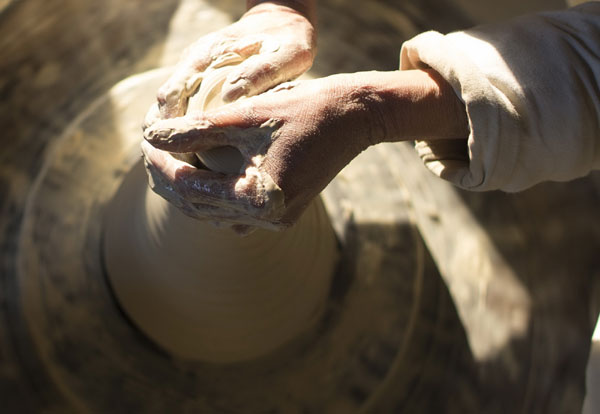The city that's all fired up about ceramics
By Peng Yining (chinadaily.com.cn) Updated: 2014-07-11 10:14
|
 |
| The interior of a workshop. Photos by Zhang Hao / for China Daily |
The local tourist industry is also benefiting from the renewed interest in the old pottery-making techniques, said Hong Ling, manager of the Ancient Kiln and Folk Customs Museum, which restored and manages the Zhenyao and Huluyao.
The number of visitors reached 1 million last year, she said, and the number of visitors from overseas is increasing.
The Zhenyao is fired twice a year, at a cost of more than 500,000 yuan each time because the kiln consumes more than 35,000 kg of wood during every firing.
"It's totally worth it, considering the attention it attracts to our goal of protecting the traditions," she said.
Jingdezhen's historical links with ceramics are the city's biggest advantage in terms of heritage, and give it an edge over other Chinese cities when it comes to attracting visitors, according to Li Jianshen, a ceramic artist based in the city. Last year, Li paid 170,000 yuan to buy four water-powered hammers, the ancient way of smashing China stone, a feldspar-rich form of granite used in the production of clay.
"If I hadn't bought them, they would have disappeared and people would never have been able to see how our ancestors made clay before machines took over the world," he said. "The name 'porcelain capital' has brought a huge number of visitors to Jingdezhen. What do they want to see? They can see modern factories, buildings and streets anywhere, but the city's tradition of pottery manufacturing makes it so special and fascinating."
Indeed, ceramics dominate the city: it has a ceramics institute, the only college in China entirely dedicated to the ceramic arts; the street lamps are decorated with blue-and-white porcelain; pottery studios and galleries displaying priceless ceramic artworks sit next to grocery stores; and in the dark, deep alleys, workers transport porcelain in wooden carts covered in heavy quilts to prevent damage to the fragile objects.
- Kunming to join list of 72-hour visa-free cities
- China's top court to 'enrich'
green tribunals - Critics busy as giant toad floats into Beijing
- Latest round of anti-missile tests hits 'preset goal'
- Love story of a 86-year-old couple
- Eight stories you want to know about square dance
- Matmo wreaks havoc in Fujian, Taiwan
- Retired officials may expect tighter rules
- Beijing police teach bus drivers anti-terror tactics
- 229 provincial-level officials quit companies







